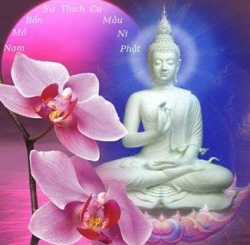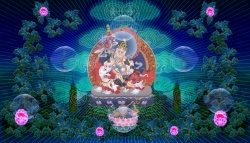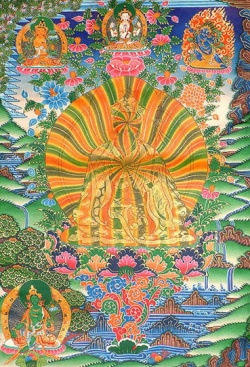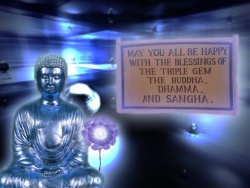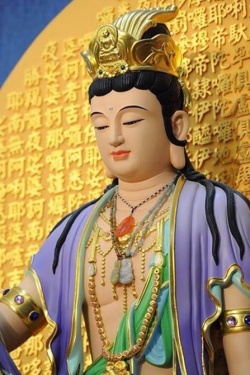Padmavajra
pad+ma badz+ra
slob dpon pad+ma badz+ra
Sanskrit Names
Padmavajra
Other Transliterations in use:
Padma Vajra
Lopön Padma Vajra
Lopon Padma Vajra
Indian Adept: Padmavajra
Padmavajra: Lotus Vajra
(Abhayadatt #74)
Indrabhuti, the king of Kanchi, had no children. Growing concerned about his lack of an heir, Indrabhuti invoked both worldly and heavenly gods to help his wife conceive and eventually a being entered her womb.
While pregnant, the queen felt increasingly peaceful and started to see signs that the child she was carrying was in some way extraordinary.
She eventually had a powerful dream in which she swallowed Mount Meru, drank the entire world?s oceans, and suppressed the three realms with the sole of her foot.
Unable to interpret this dream, Indrabhuti recruited his kingdom?s most learned astrologers and priests to explain its potential indications.
It was widely agreed that the dream was a sign that the unborn child was to be a great Bodhisattva king and that his birth would be accompanied by a massive shower of riches falling from the sky.
The child was magically born in the center of a large lotus in the middle of a lake. As was foretold, great material wealth fell from the sky all across the country.
The child was named Padmavajra and because of his good merit the people of Kanchi remained prosperous for some time.
When Indrabhuti died, Padmavajra refused to become the new king and the throne was inherited by his younger brother.
Padmavajra then decided to leave home and travel to Shri Dhanyakataka and become a monk.
While on the road he was approached by Avalokiteshvara who was disguised as another monk.
After testing Padmavajra, Avalokiteshvara gave him powerful initiations, instructions, and blessings.
Upon receiving this teaching Padmavajra immediately set out to enter a solitary retreat and practice meditation for twelve years.
While Padmavajra was in retreat he was one day visited by a wandering yogin.
Impressed by Padmavajra, the yogin offered to serve him.
His only condition was that upon attaining enlightenment, Padmavajra would then agree to be his teacher.
Padmavajra agreed and the two lived together, Padmavajra practicing meditation and the yogin walking into the town every day to beg for food.
At this time a great drought struck all the lands of the region and caused a wide spread famine.
It became much harder for the yogin to find sustenance but he remained determined to serve his master.
Fearing that knowledge of the famine would distract Padmavajra from his meditation, the yogin did not tell him about it and attempted to live only on his leftovers.
Eventually came a day when the yogin was only able to find a small bowl of uncooked rice and by the time he had brought it all back to Padmavajra he was close to starving and collapsed. The yogin was no longer able to hide the fact that there was a famine from his master.
When the yogin told him about the horrible droughts and famine, Padmavajra became angry and scolded the yogin for not telling him, stating that he has the power to bring rain.
Padmavajra then took the bowl of rice and took them to a nearby stream where he made offerings to the nature spirits.
He was able to coerce these spirits into making rain and ending the famine as well as make food and riches fall from the sky to ease the people?s suffering.
Word of Padmavajra's great power spread quickly and many people became inspired and sought to become spiritual practitioners.
Padmavajra also held to his word and gave the yogin who had served him initiations and instructions with which the yogin studied and practiced diligently, quickly achieving magical powers.
Padmavajra then rose into the sky and entered the Dakini's paradise. The yogin went on to find a consort and build a great temple to the god Rama.
Source
http://www.himalayanart.org/search/set.cfm?setID=334
Khyabdak Padma Vajra, the All-Encompassing Lord
The Body, Speech and Mind of all the Sugatas of the three times
In one indivisible Body,
In your manifest form you are Master of the Wrathful Deities holding a vajra:
Homage to Khyabdak Padma Vajra.

